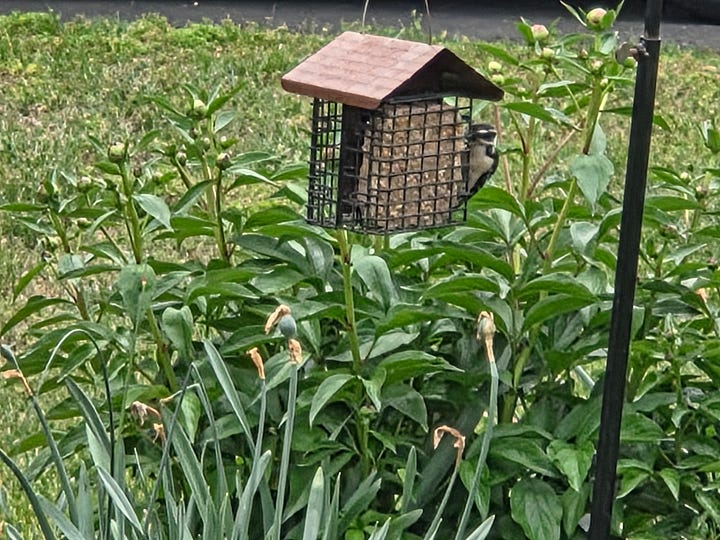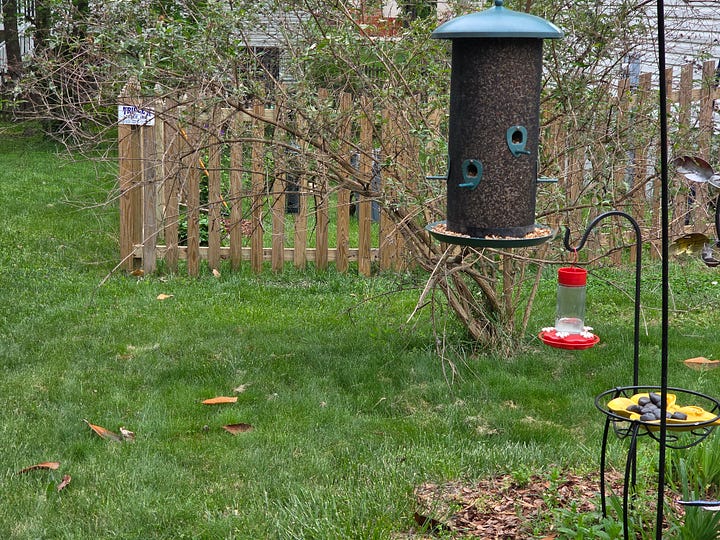Backyard Bird Watchers Get Feathers Ruffled
Avian flu is dangerous, but should backyard bird feeding stop? A city announcement last week suggested yes. The answer is more complex.
By Martin Davis
EDITOR-IN-CHIEF
Email Martin


“Do not handle sick or dead wild birds. Do not feed the birds [emphasis added].”
That was the advice that the city of Fredericksburg sent out via a public safety announcement on April 16. The concern? Avian flu, which has been in North America since late 2021, is a problem in our area.
Understandably, that warning rattled local birdwatchers — especially those with backyard bird feeders. The Advance began fielding questions from readers this week. Amy Gardner of Wren & Sparrow in downtown Fredericksburg said that “at least 20 people” have asked her if it’s safe to feed the birds.
As it turns out, Avian flu is a real concern that people should be made aware of, but this does not mean that people should stop feeding birds from feeders in their yards.
Confused?
As with the spread of any disease, the devil is in the details. Yes, avian flu is deadly, but the level of risk varies considerably depending upon the type of bird.
The Virginia Department of Wildlife Resources on its page about Avian Influenza, wrote that the flu “is a viral illness commonly found in certain wild bird populations, most notably waterfowl and shorebirds. Wild birds, including waterfowl and some shorebirds and seabirds, may carry a variety of avian influenza (AI) viruses without exhibiting clinical signs of illness.”
The site also says that the flu can “change into forms that are deadly to domestic chickens and turkeys.”
Further, in Virginia, deaths from the virus have been noted in “vultures and other raptors, avian scavengers (gulls, crows), some shorebirds and waterbirds (sanderlings, grebes), and some waterfowl (primarily geese).”
Notably missing from those lists? The typical types of birds that visit backyard birdfeeders.
DWR reports that transmission rates for avian flu in songbirds “is typically much lower than in some other types of birds.”
Its advice to bird lovers with backyard feeders? Removing bird feeders usually isn’t necessary unless other factors are present — for example, “if sick or dead birds of any species are witnessed around a bird feeder.” In that case, the feeder should be taken down “for several weeks and thoroughly disinfected.” (More information about safely feeding birds at feeders is available at the DWR Safe Bird Feeding webpage).
Note: If you find dead birds, DWR says you shouldn’t handle them. If you must remove them, “wear rubber gloves and other personal protective equipment, such as a mask and eye protection, then bury the carcass or double-bag and dispose of it in a covered, secured trash can or place it in a landfill. After disposing of the carcass, wash hands and clothing and disinfect shoes.” (Learn more)
The advice offered by CornellLab — considered a leading authority on birds — is similar to that offered by DWR.
There has been widespread transmission of avian flu to wild bird species including waterfowl and raptors. However, there have been relatively few documented cases of HPAI in songbirds and other typical feeder visitors to date, although this may change with increased testing or changes to the virus. That means there is currently a low risk of an outbreak among wild songbirds, and no official recommendation to take down feeders unless you also keep domestic poultry, according to the National Wildlife Disease Program. We do always recommend that you clean bird feeders and birdbaths regularly as a way to keep many kinds of diseases at bay.
So why did the city say “Do not feed the birds?”
The Advance emailed the city and asked why its recommendation went beyond that offered by CornellLab on how to deal with Avian Flu.
Caitlyn McGhee, the city’s Public Information Officer said that “Our role has been to share timely information from trusted sources to inform the community. For more detailed information, we recommend contacting state agencies or referring directly to guidance from the CDC and other federal health authorities.” She further provided links to the DWR site, which, as previously noted, does not instruct people to remove bird feeders, and to the CDC’s site on avian flu, which doesn’t appear to reference whether people with bird feeders should stop feeding the birds.
The Advance has followed up with the city, but as of press time on Friday afternoon has not received a response. When we receive one, we will update this article.
Additional Information
According to DWR, if you observe any of the following wild bird occurrences, please notify DWR by calling the Virginia Wildlife Conflict Helpline at 855-571-9003 or emailing wildlifehealth@dwr.virginia.gov.
Five or more dead vultures, waterfowl, shorebirds, or seabirds in the same area within five days
Sick or dead eagles, hawks, owls, or turkeys, excluding carcasses found on the road
Ten or more dead wild birds of any other species in the same area within five days
Local Obituaries
To view local obituaries or to send a note to family and loved ones, please visit the link that follows.
Support Award-winning, Locally Focused Journalism
The FXBG Advance cuts through the talking points to deliver both incisive and informative news about the issues, people, and organizations that daily affect your life. And we do it in a multi-partisan format that has no equal in this region. Over the past year, our reporting was:
First to break the story of Stafford Board of Supervisors dismissing a citizen library board member for “misconduct,” without informing the citizen or explaining what the person allegedly did wrong.
First to explain falling water levels in the Rappahannock Canal.
First to detail controversial traffic numbers submitted by Stafford staff on the Buc-ee’s project
Our media group also offers the most-extensive election coverage in the region and regular columnists like:
And our newsroom is led by the most-experienced and most-awarded journalists in the region — Adele Uphaus (Managing Editor and multiple VPA award-winner) and Martin Davis (Editor-in-Chief, 2022 Opinion Writer of the Year in Virginia and more than 25 years reporting from around the country and the world).
For just $8 a month, you can help support top-flight journalism that puts people over policies.
Your contributions 100% support our journalists.
Help us as we continue to grow!
This article is published under Creative Commons license CC BY-NC-ND. It can be distributed for noncommercial purposes and must include the following: “Published with permission by FXBG Advance.”












